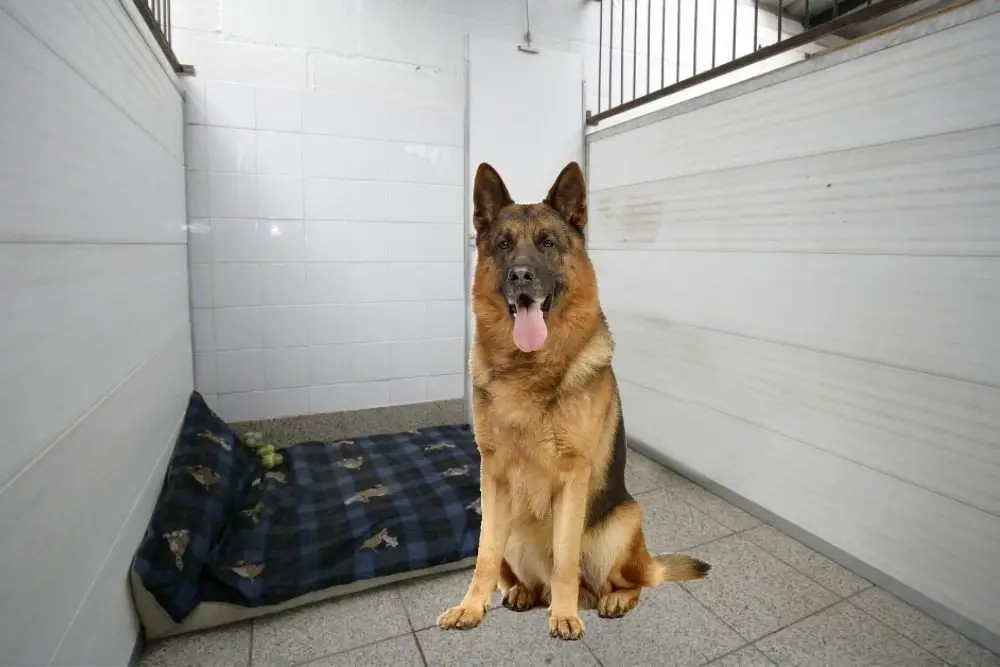Dog Boarding Tips
The thought of leaving your dog in the care of strangers can cause anxiety for many pet parents.
Some dog owners can leave their dogs with trusted friends or family members, but many pet parents don’t have this option.
Dog boarding your four-legged best friend may be needed when travel plans won’t accommodate including your dog.
Professional dog boarding services can ease your mind knowing your dog will be looked after while you’re away.
There are occasional horror stories that hit the news about a boarding facility or boarding experience gone wrong. However, more than thirty million pet owners depend on professionally run kennels to house their pets each year.
Dog boarding facilities will vary in size, staffing, amenities, and price. It’s important to research a kennel to ensure your dog has a safe and happy boarding stay.
How to Find a Dog Boarding Kennel
The best way to find a boarding facility is through word of mouth. The fastest way to ask for recommendations from friends, family, or groups is on social media.
Another resource tool is to Google dog boarding near me.
Once you have found dog boarding facilities in your area, you have some more homework to do.
9 Dog Boarding Do’s
1. Online Research
Reputable businesses have an online presence, and dog boarding facilities are no exception. Scroll through their website.
- Read the about section
- Read their boarding requirements and fees
- Look at pictures
- Do they have testimonials on their website?
Like what you see? Keep digging. If they have a social media page, look at it. If they have testimonials on their website, they will all be positive. Search other online resources like social media or Yelp to find unbiased reviews.
2. Make an Appointment to Tour the Facility
If you are happy with your online research, the next step is to visit the facility in person. Don’t wait to see the facility the day you drop off your dog.
Travel is stressful enough without adding an unseen dog boarding kennel and realizing you are uncomfortable leaving your dog in the care of the facility or staff but now have no other options due to travel timeline constraints.
Dog boarding facilities run on schedules, and smaller facilities may not have staff available for unexpected drop-ins, so call and schedule an appointment.
3. Dog Boarding Questions to Ask
Even though a dog boarding facility may be highly recommended by a trusted source or have a detailed and informative website, ask a lot of questions while visiting the location.
- What vaccinations are required?
- Will staff interact with your dog one-on-one?
- What is the training and experience of staff?
- Are kennels indoor, outdoor, or indoor and outdoor runs? Are kennels climate-controlled? Ask to see the kennel area.
- Are you allowed to bring your dog’s food?
- Can the facility accommodate a special diet your dog is on?
- Will the facility administer meds if applicable?
- Can the facility accommodate a special needs situation? Ask them how?
- Are dogs allowed out of their kennel for play and exercise? Is this an extra charge?
- How many dogs are allowed out together?
- How many staff members supervise playtime? Ask to see the play or exercise area to ensure it’s fenced and secure.
- Is the facility staffed overnight?
- Does the facility have webcams you can tap into?
- Will the facility send you updates?
- How does the facility handle injuries or accidents?
- What veterinarians or clinics does the facility use in case of emergencies?
- Ask if grooming is available before pick-up? How much?
- How far in advance do reservations need to be made?
- Are reservation deposits required?
- Ask what daily boarding fees are and if there are extra fees for early or late pick-ups or anything else?
- Is there a discount for two or more dogs?
- Are dogs from the same house kenneled together or separate?
- Are crates or beds allowed?
4. Book Your Reservation
When you find a boarding kennel you like, don’t procrastinate making your dog’s reservation. Popular travel times like holidays and summer months can be busy and book fast.
When booking your dog’s reservation for the first time, clarify what you need to provide or fill out when dropping off your dog.
5. Make Sure Vaccinations are Current
Responsible boarding facilities will require proof of vaccinations.
The most common are:
- Bordetella (Kennel Cough)
- Distemper
- Parvovirus
- Rabies
Contact your veterinarian to confirm your dog’s vaccinations are current and ask them to send your dog’s records to the boarding facility electronically.
Follow up with the boarding facility to confirm they have received your dog’s vaccination records.
6. Prepare for Your Dog’s Stay
Prepackage your dog’s food into easy serving portions for facility staff. Place the food into a larger bag with your dog’s name on it.
The same goes for medications, supplements, or any other consumables. Write instructions on a 3×5 index card with your dog’s name.
It’s not a bad idea to pack an extra day’s worth of supplies, “just in case.”
Decide if you will leave a crate or bedding with your dog at the facility if it’s allowed. Comforts from home can help ease your dog’s anxiety during their stay.
7. Drop Off Day
Exercise your dog right before dropping them off. The burning of excess energy may keep your dog calmer and more relaxed as they adjust to new surroundings.
Arrive early the first time dropping off at a boarding facility. You will have paperwork to fill out and sign.
Leave your dog in the car, so you talk with staff undistracted.
Go over food, medications, contact numbers, and emergency contact numbers. Let the staff know anything that might be of concern about your dog, like aggression, dominance, anxiety, allergies, eating poop, etc.
The more staff knows about your dog, the better equipped they can keep your dog safe and monitored.
When it’s time to pass your dog over to the boarding staff and leave, make it quick. No long and drawn out goodbyes.
8. Pick Up Day
Respect the facility’s pick-up hours. If you are running late, call and let them know.
It’s okay to call and confirm your dog will be ready to check out at your designated time.
Ask how your dog did during their stay. Any behavior problems? Loss of appetite? Make any new friends?
Tip the staff if it’s appropriate, like groomers, etc. If your dog’s stay was a positive one, show the boarding facility your appreciation by leaving a review.
9. Your Dog’s Recovery
Do expect your dog to be happy to be home but exhausted. It’s not uncommon for them to sleep 8 to 10 hours or more.
Some dogs will be famished from not eating well or burning off so much energy. Don’t be concerned if your dog has lost a few pounds during its boarding stay.
Some dogs have a hoarse bark for a few days due to excessive barking at the boarding facility. A few days of rest, and your dog will be back to its usual self.
6 Dog Boarding Dont’s
1. Don’t Expect the Facility to Accommodate Your Schedule
Don’t expect the facility to make acceptions to their drop-off or pick-up times because of your travel schedule.
You may need to drop your dog off the day before your travel or pick them up the day after you return. Plan accordingly.
2. Don’t Expect the Facility to Follow Your Feeding Schedule
Boarding facilities manage a lot of dogs and run on a schedule.
You may feed your dog at 6:00 in the morning and 6:00 at night. The boarding facility may start feeding at 7:00 in the morning and 5:00 at night.
Don’t sweat the small stuff. Your dog will adjust and be fine.
3. Don’t Expect Bedding or Your Dog to Return Home Clean
Reputable boarding facilities will clean their kennels multiple times per day. However, dogs like to do doggy things like play with friends, roll in grass, and run through water.
Mud, dirt, and silva will make it’s way to your dog’s crate or bedding. Crates are easy to clean but make sure bedding is machine washable.
Your dog shouldn’t stink on pick-up day but don’t expect them to smell as good as they did on drop-off day if bathing or grooming isn’t an option.
4. Don’t Be THAT Dog Parent
Don’t list irrelevant details or facts about your dog that staff doesn’t need to know.
Don’t call the facility multiple times a day to check on your dog. It’s okay to check in a few times but don’t go overboard.
5. Don’t Be Vague on Facility Paperwork
Paperwork is a drag but fill everything out as completely as possible. Your dog’s file will be what the staff references for food, meds, contact numbers, etc.
6. Don’t Show Up Unannounced
Plans can change, which may allow your schedule to pick your dog up earlier than scheduled. Don’t show up unannounced.
Call the facility to coordinate a new pick-up time.
Dog Boarding Red Flags
When researching and visiting boarding kennel, here are some things to raise caution in your spidey senses.
- The facility has no reviews anywhere.
- The facility won’t allow you to visit before booking.
- The facility is dirty or smells. Don’t expect a dog boarding facility or kennels to be white glove pristine, but the place shouldn’t reek of urine. Also, we can all tell when a dog has recently created something hot and steamy versus poo that is aged and not picked up.
- Staff isn’t knowledgeable or is evasive on questions.
- The facility seems understaffed.
- Safety hazards are apparent upon visiting.
- The facility charges extra for feeding your dog’s food brought from home. The facility may market this as one less thing for you to worry about. However, this is really about feeding time being easier for staff. What else is this place taking shortcuts on?
- The boarding fees are unusually low or extremely high.
Boarding your dog isn’t for everyone, but some pet parents have no other options.
Most people spend time researching travel plans. Use the tips above and put the same amount of effort into finding a boarding facility that will keep your dog safe and well cared for while you are away.





















